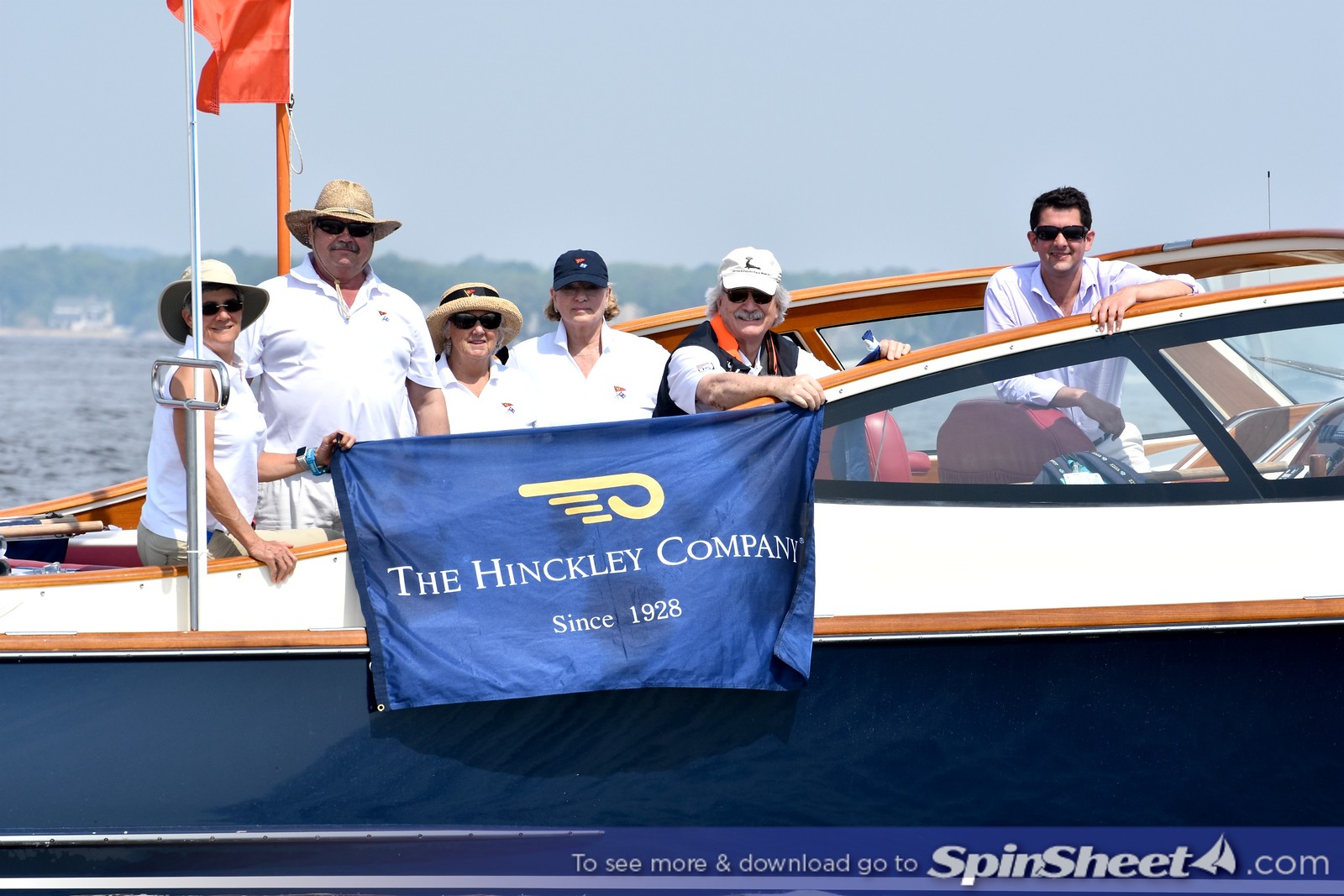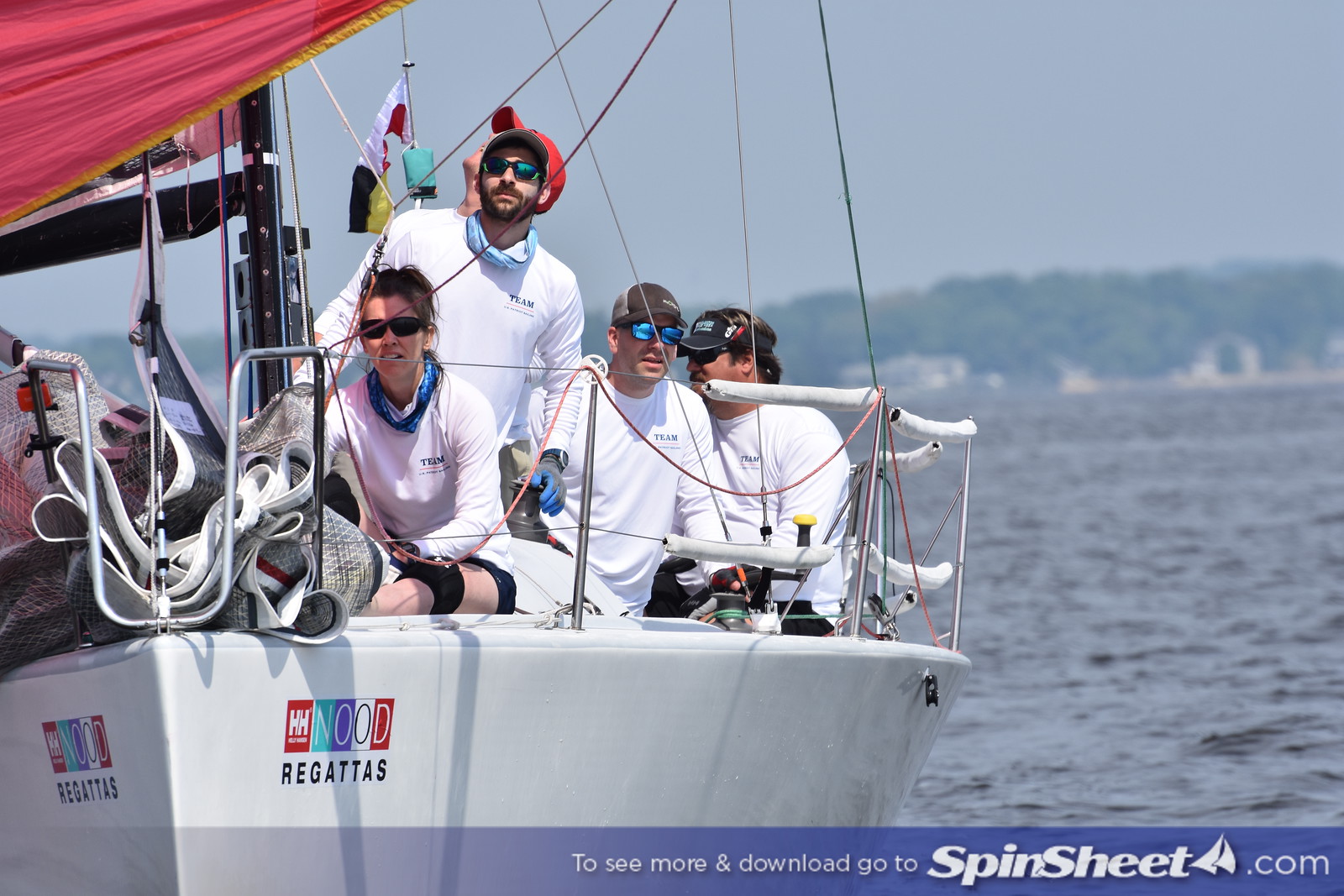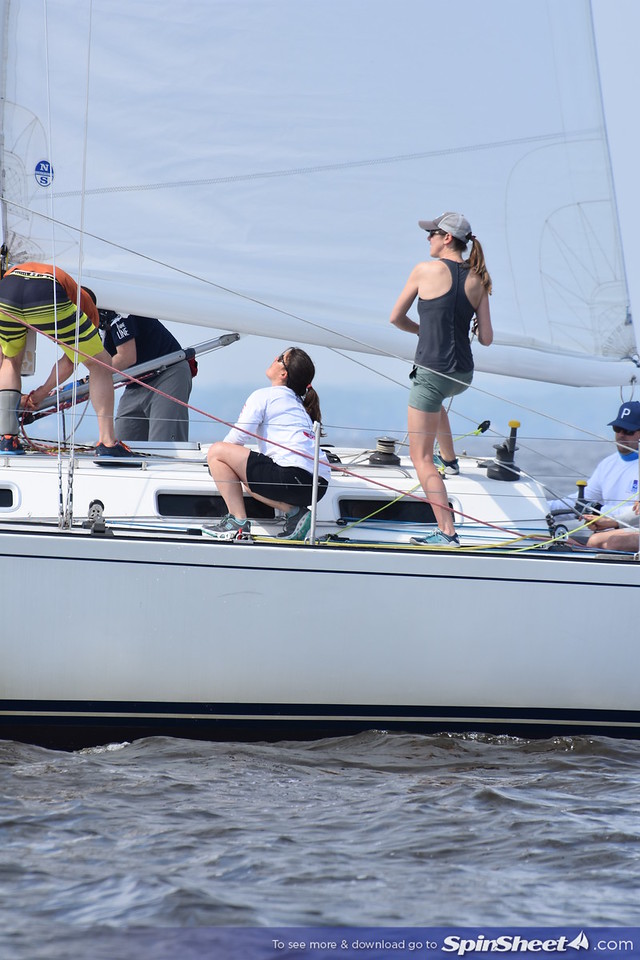AYC’s Spring Oxford Race: Feedback from Our Editor, Racers, and the RC
Since there’s been so much chatter over the airwaves about the fizzled Annapolis Yacht Club Spring Oxford Race May 12, we thought we’d compile the feedback we had: the Monday Racing Roundup piece from SpinSheet, racer feedback that followed, and then feedback from the race committee chair after the debrief meeting.
From SpinSheet’s Monday Racing Roundup May 14
The inaugural Annapolis Yacht Club Spring Oxford Race started well for 85 boats in an unanticipated and then diminishing northerly breeze. There was some radio confusion at the start over check in (boats needed to check in at the RC boat, not by radio)…

Mid-race there was some confusion as to how close one gets to ships under way. Here’s a tip: you DON’T get close to ships under way. Ever. We were astounded by how dangerously close sailboats in the race got to ships traveling as fast as 19 knots up and down the Bay. We even heard one Bay pilot say “You should be ashamed of yourself how close you came to this ship.” Click here for nine ways to avoid ships on the water.
Then, on the other side of the shipping lane as the afternoon set in and the winds grew yet even quieter, there was even more confusion, as southbound racers nearing the Choptank tried to establish if the course would be shortened and/or the race was abandoned. The RC flew the November flag at 3:20 p.m. It seems that many did not get the memo about the race abandonment. A handful of those who did hear the three blasts and announcement over the VHF were angry enough to rant about it.
Then, SPIT was flying over the airwaves. Full disclosure, your friendly SpinSheet editor was on a boat that had already dropped out, which is always disappointing, but being on a slow boat who’s really there to enjoy the company of friends and not to win, it’s easy to make the decision. The race abandonment was much harder on competitive boats that were still in the game.
That racers were angry is understandable. It’s frustrating to have an RC make a decision that makes no sense from your perspective. The manifestation of that anger---making nasty, anonymous comments about the race committee and host yacht clubs (AYC and Tred Avon Yacht Club) over the radio—was unsportsmanlike. We’re grown ups here playing a game, supposedly in the Corinthian spirit. Let’s add that the race was free, thanks to sponsor Hinckley Yachts, and that the race committee members are all volunteers.
To those of you who DID identify yourselves while giving helpful feedback on the radio (here’s lookin’ at you Marc Briere on Cheetah), thank you. We don’t yet know the RC’s perspective, but we will connect once they have done their own debrief meeting and will share their thoughts AND some ways you can submit your opinions in a constructive fashion that may help RC in the future.

Racer Feedback
Just read your article on the Oxford race… I strongly disagree with your comment about the radio calls being unsportsmanlike. What was unsportsmanlike was the arbitrary and capricious decision by the “Race Committee” to abandon the race without comment, especially when there were at least a dozen boats RIGHT AT THE FINISH LINE! I was aboard one of those boats at about 500 yards from the line when the announcement went out. We were at first confused, then very angry. We – along with all the other boats which were there at the line – had fought hard all day to get to that position only to have them thumb their noses at us and simply up their anchor and drive away when they heard the reaction on the radio.
The racing rules of sailing, rule 32.1, specifically states:
After the starting signal, the race committee may shorten the course (display flag S with two sounds) or abandon the race (display flag N, N over H, or N over A, with three sounds), as appropriate,
- because of an error in the starting procedure,
- because of foul weather,
- because of insufficient wind making it unlikely that any boat will finish within the time limit,
- because a mark is missing or out of position, or
- for any other reason directly affecting the safety or fairness of the competition,
In addition, the race committee may shorten the course so that other scheduled races can be sailed, or abandon the race because of an error in the starting procedure. However, after one boat has sailed the course and finished within the time limit, if any, the race committee shall not abandon the race without considering the consequences for all boats in the race or series.

Going through the above, a, b, and d are out because nothing there would cause an abandonment. I suggest that e is out because there was nothing going on that affected safety or fairness. Everyone sailed the same course with the same conditions and therefore fair and – with the exception of what you noted in the article that several boats were danger close to the deep drafts transiting through the racecourse – there was nothing safety related. Since that happened several hours earlier that could not have been the cause of the abandonment.
So that leaves c. Yet that could not have been the cause because there were boats ready to finish well within the time limit. I watched as the RC boat upped anchor and drove away. I saw that other boats continued past the finish mark under sail before starting engines. Many turned back in disgust. We rounded G7 at 15:43:20. The finish time limit was 1700, with all boats being finished or TLE’d by 1800.
So I’m very curious as to why they felt the race should have been abandoned. By the way, I never saw the flags raised which indicated that the race was abandoned. Only the radio call. And not every boat got that. The RC should have stayed on station until all racers had acknowledged that the race had been abandoned. During the sail back we saw several boats which thought the race was still going on and were frantically trying to reach the RC to confirm, only to be met with silence.
I heard a comment by several folks when I arrived back in Annapolis as to why some boats didn’t continue to on to Oxford that evening. They were concerned that after the party was attended and the drink tickets sold the RC would step in and tell folks that the bar is closed just before the first drink was sold. I thought that comment both funny and sad. But relevant.
As an aside, we had a very comfortable run back up the bay in 12-15 knots of southerly breeze. It was a great way to end a very disappointing day. I think that the AYC have set themselves up for failure very well this year, straight out of the gate. ~Dan Lawrence

This comment below was from our Facebook page:
Nicholas Zahn: Regarding the oxford race, it was a shame that it was cancelled, as even the slow boats were out of the doldrums just a bit after the race was called. It was a beautiful sail into the choptank when the breeze filled in.
An interesting discussion occurred on Firefly, as we simultaneously listed to the back end of the fleet trying to get information from the front at the same time as the USCG was contacting vessels and referring them to use their cell-phones for communications with the USCG.
It might be an interesting to add an experimental provision in the SIs future long-distance races by adding supplemental notifications using text messaging for on-course changes such as shortenings, abandonments, etc.
RCs could even utilize their existing club twitter accounts, by having racers 'follow' their account with SMS notifications.
Word from the Race Committee
“It was frustrating that the wind did not cooperate,” says AYC race chair Sandy Grosvenor. “We thought we’d shorten the race, and we watched the thermal start to come from the south and then die. The leaders were moving but very slowly. The decision I had to make was on the overall picture. The final deadline was 6 p.m. and boats still had a one- to two-hour motor to the Tred Avon. There was a lack of overall progress. I saw no wind at all.”
The race chair from TAYC was onboard, so Grosvenor asked her for opinion on the thermal as someone with local knowledge. “She thought it was over for the day.”
The RC flew the November flag to abandon the race and announced it on the VHF with three blasts at 3:14 p.m., much to the dismay of those who felt they were still making progress. Many racers were vocal about their disappointment on the radio; many quickly spun around and motored home.
“It was a tough decision,” says Grosvenor. “I’ve had a race get abandoned right in front of me before, as a racer. I know. It was a decision that I had to make. The only way I could make the decision worse was to abandon after a few boats finished. There’s no way to make everybody happy with any decision. We learned a lot in this race.”
The RC held its debrief meeting and will make some changes for the upcoming AYC Solomons Race (September 22) and next year’s Spring Oxford Race. One of the problems with this year’s race was logistical in nature. AYC chose to start the race on RC boats based out of Annapolis and finish with one based out of Oxford. This meant no RC boat on the race course, which led to some radio disconnect. For future point-to-point races, AYC will have a boat shadowing the fleet.
Other changes will come in the form of having a time limit for the first boat in a class to finish but not a second one for the remaining boats, which should help classes such as the Hinckley class and CRCA. AYC will also not abandon a point-to-point race prior to the time limit due to light winds. AYC will probably add a provision for late finishers to take their own finish time if they cross the finish line after the RC leaves. And the RC must consider whether they want boats out in the dark.




